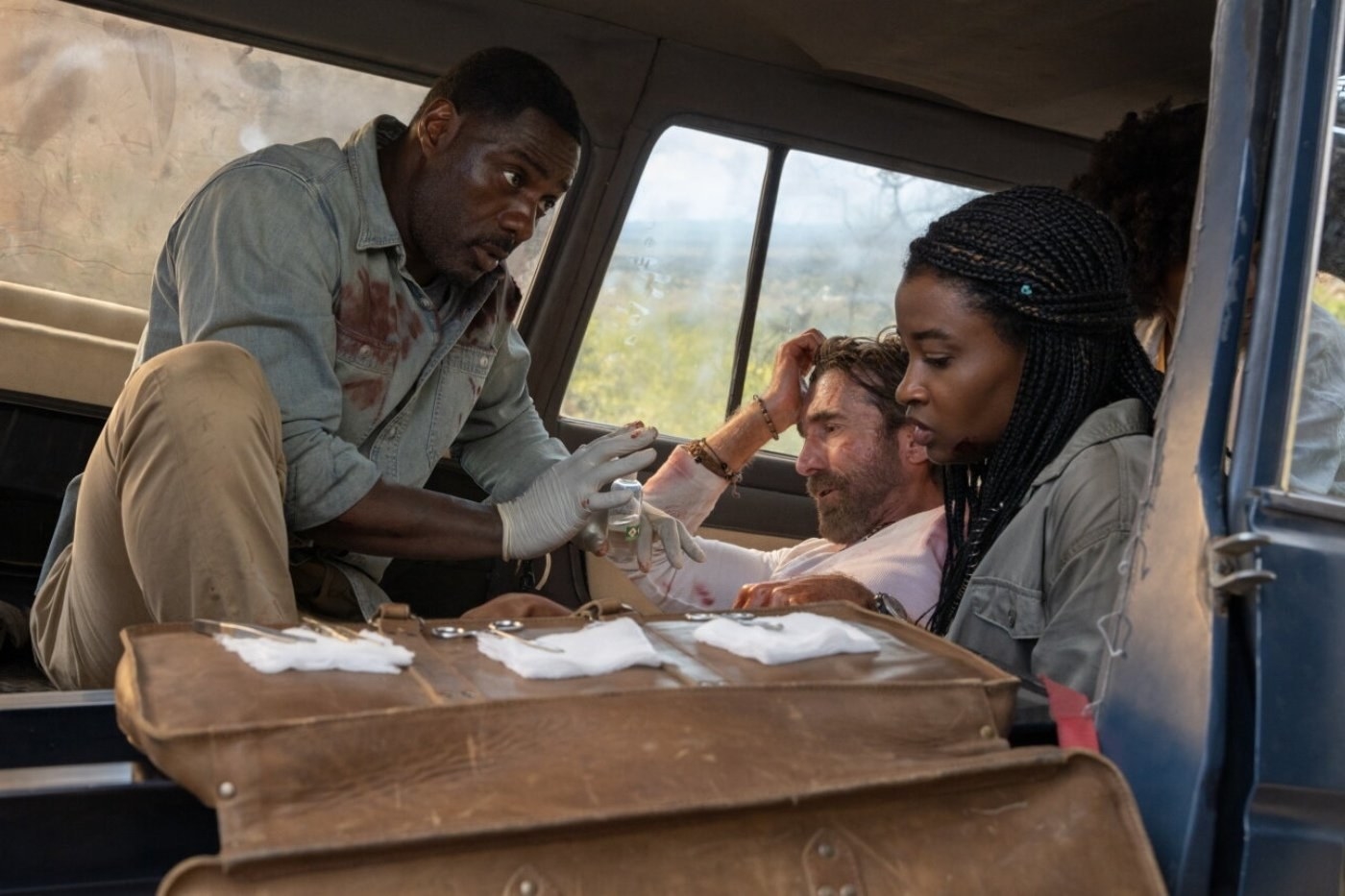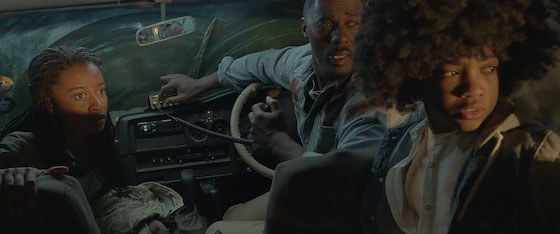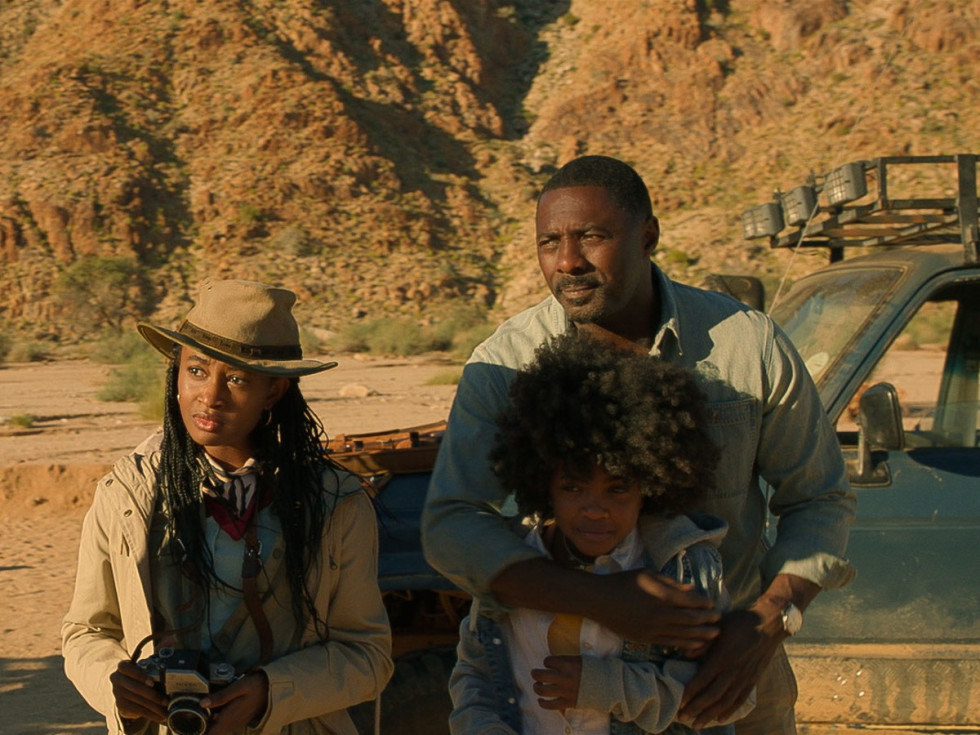You know, I’m a fan of the survival thriller genre. I think that when done right, it’s kind of the perfect blend of escapism, a thrill ride with edge-of-your-seat stakes when you do it right. And so I had never done anything in this genre before. I’m a fan of it. I was presented with the idea of a man and his family in peril on the run from a man-eating lion. And when I started researching it, I realised that the idea – although obviously, this is the extreme – is not that far off from what really happens. I think that what really got me invested in it was learning about poachers, and how they actually do destroy a lion prize, and alpha males will end up being nomadic lions just roaming without a pride. Poaching begets more violence, so there’s a whole world out there that is spurned by the fact that man does not have enough respect for nature, and we know that to be true whether we’re talking about poaching or global warming. So I liked that aspect of it. But at the end of the day, it is supposed to be escapism, it is supposed to be fun. And it’s a genre that lends itself to that in my opinion. How did you approach balancing that kind of escapism with the real-world aspects like the family dynamic? For the thrills to be real thrills, you have to have characters you’re invested in. And in order for the characters you’re invested in to take you on this journey, you’ve got to put them in real grounded peril. So it goes hand in hand. I think it’s a good mix of elements to make for an entertaining film, but also make for a film that has something to say, but doesn’t take itself too seriously. From thrillers to comedy, you’ve covered so many genres across the course of your career. Do you have like a bucket list of genres you want to take on? I do have a bucket list of like genres that I want to hit, yeah. I definitely want to do sci-fi. That’s on the list. I want to do horror – I’ve dabbled with it but haven’t done my definitive horror movie yet. I love telling stories. And I love telling stories from perspectives that maybe we haven’t seen or heard before. And so that can cross a variety of genres. If the story is good, then I’m interested. I think it’s something I can tell in an elevated way, I think it’s a project that I can bring something to. He sprung to mind when the project came. He’s always somebody that I think of for projects. We work together and I enjoy working with him. This is our sixth movie together and that’s a lot in this business. You know, we’ve got a trust and a shorthand. I am always thinking of projects that could be good, but, not all projects fit. I only bring him things that I think he could really win with, you know, projects that I think have got a real viability and they’ve got a character that he hasn’t played before. That’s important. And I know he takes that very seriously. But he’s always top of mind because, in my opinion, he’s absolutely one of the best working in the business today. And then when it came to the daughters, how did you approach the casting there? You know, we always thought about up-and-coming talent, and we cast a wide net. When it came time to fill these roles. A lot of people came in and these two amazing young actresses Iyana Hallet and Leah Jefferies beat out a lot of actors. I give them all the props and kudos in the world, I think that they’ve got some real talent. I think they’re part of the next generation that you got to keep an eye on you’re gonna be seeing a lot from them. It was a pleasure to work with them. You’re talking about actresses that are very young and had to go toe to toe with somebody like Idris Elba. That’s a hell of a task for an adult actor who’s been doing it for a while, and they were up to the task. So we always I always thought, let’s just find the best folks for the role, let’s think about new fresh faces, and we found it. Yeah, I think a lot of it is definitely instinctive. I trust my instincts and they’ve fared me well, so far. I’ve been very fortunate to have a great career in this business; I’m very proud of it. I don’t think it’s changed in terms of me trusting my instincts. But the business is constantly evolving, and I have to be able to be malleable and evolve with that. And that has to do with the way that I think about how we make films – from telling narratives to the distribution method for those films. But at the end of the day, I think you hit on the fact that it’s still very intuitive in terms of the projects that I select, versus those that I don’t, and those that I choose to be a part of. I always think about the audience first, who am I making this for and who would truly enjoy this project. Speaking of the audience, has the rise of streaming impacted how you tell stories? I don’t think so. I think I’m are making projects for a particular platform in mind, right? We always thought of Beast as a theatrical film. You have an end medium in mind when you’re making a film – I think that that’s important. But I also think that you have to be malleable. You have to be willing to make content for where your audience is. And I think the audience dictates that, not filmmakers and not Hollywood Studios. They control where their time, energy, and resources go. So as filmmakers, we have to be willing to make a variety of projects. I think there’s nothing wrong with having a particular medium in mind for initial distribution. But you know, the audience is the audience, and they find good content that they want to see. You filmed Beast out in South Africa. Was that always what you wanted to do? We talked about some other locations, that probably would have been easier – definitely in terms of getting there and having a little more of the creature comforts that we’re used to having on movie sets. But I will tell you that was nothing like shooting in South Africa. It was incredible. It was a challenging shoot, but it was well worth it – being in that environment and being able to showcase the beauty of the motherland. In a film like this, where we’ve got obviously a big CGI element in the lion, but everything else being authentic, I think is huge and goes a long way towards the audience’s experience of feeling this and it feels like an organic backdrop for this type of movie, not just a CGI lion against a green screen. African savannah; we didn’t want to make that up. I have, but not to this extent. This is definitely the most CGI that I have had in any of my projects, and it was quite an experience. I’m very proud of it. Our VFX team did an excellent job. It’s been a lot of work – it’s an arduous task to recreate a full adult male lion and make it feel real. And a lot went into it in a relatively short period of time, and they did a good job, they really did. And just one last thing I wanted to ask about was the Oscars ceremony, which was obviously historical for lots of reasons. I read that you had declined to produce the Oscars before – what was it about this year that made you want to do it? I felt like there was never going to be a perfect time to do it. I didn’t have the time to do it before, and I realised now that I didn’t have the time to do it this year. But I feel like in life if there’s something that that you’re not doing for some reason, you should hit it head on. Why is it that you’re avoiding something, whether it’s a difficult confrontation with a family member or some kind of a challenge that you keep putting off and putting off – I felt like this was a challenge that I had been putting off. And I said, “you know what, this is the year. I’m never gonna have time. There’s never going to be a perfect moment. Let’s do it this year”. And little did I know that I would do the year of the Oscars that will be talked about forever.


